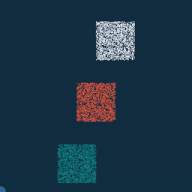The Taichi Programming Language
Project description

import taichi as ti
Taichi (太极) is an open-source, imperative, parallel programming language for high-performance numerical computation. It is embedded in Python and uses just-in-time (JIT) compiler frameworks (e.g. LLVM) to offload compute-intensive Python code to the native GPU or CPU instructions.
Advantages of Taichi:
- Built around Python: Taichi shares almost the same syntax with Python, allowing you to write algorithms with minimal language barrier. It is also well integrated into the Python ecosystem, such as NumPy and PyTorch.
- Flexibility: Taichi provides a set of generic data containers known as SNode (/ˈsnoʊd/), an effective mechanism for composing hierarchical, multi-dimensional fields. This can cover many use patterns in numerical simulation (e.g. spatially sparse computing).
- Performance: Through the
@ti.kerneldecorator, Taichi's JIT compiler automatically compiles your Python functions into efficient GPU or CPU machine code for parallel execution. - Portability: Write your code once and run it everywhere. Currently, Taichi supports most mainstream GPU APIs, such as CUDA and Vulkan.
- ... and many more features! A cross-platform, Vulkan-based 3D visualizer, differentiable programming, quantized computation (experimental), etc.
Getting Started
Installation
You can easily install Taichi with Python's package installer pip:
pip install taichi
If you want to try out the latest features, we also provide a nightly package:
pip install -i https://test.pypi.org/simple/ taichi-nightly
The nightly package can and will break from time to time!
Supported environments
- Operating systems
- Windows1
- Linux
- macOS
- Python: 3.6 ~ 3.9 (64-bit only)
- Compute backends
- x64/ARM CPUs
- CUDA
- Vulkan
- OpenGL (4.3+)
- Apple Metal
- WebAssembly (experiemental)
1. On Windows, please install Microsoft Visual C++ Redistributable first.
Your first Taichi program
Here's how you can program a 2D fractal in Taichi:
# python/taichi/examples/simulation/fractal.py
import taichi as ti
ti.init(arch=ti.gpu)
n = 320
pixels = ti.field(dtype=float, shape=(n * 2, n))
@ti.func
def complex_sqr(z):
return ti.Vector([z[0]**2 - z[1]**2, z[1] * z[0] * 2])
@ti.kernel
def paint(t: float):
for i, j in pixels: # Parallelized over all pixels
c = ti.Vector([-0.8, ti.cos(t) * 0.2])
z = ti.Vector([i / n - 1, j / n - 0.5]) * 2
iterations = 0
while z.norm() < 20 and iterations < 50:
z = complex_sqr(z) + c
iterations += 1
pixels[i, j] = 1 - iterations * 0.02
gui = ti.GUI("Julia Set", res=(n * 2, n))
for i in range(1000000):
paint(i * 0.03)
gui.set_image(pixels)
gui.show()
If Taichi is properly installed, you should get the animation below 🎉:
Documentation
Taichi's documentation is available at https://docs.taichi.graphics.
Contacts
We use these channels to report bugs, discuss design, show off demos and send announcements on a daily basis:
- GitHub Issues
- GitHub Discussions
- Taichi 中文论坛
- Slack & Wechat groups: please send us a message at contact@taichi.graphics first, thanks!
Should you spot any security issue, do not hesitate to report it by mailing to security@taichi.graphics.
Contributing
If you would like to contribute to Taichi, please check out the Contribution Guidelines.
A huge thanks to all of our amazing contributors!
Contributor avatars are randomly shuffled.
Resources
Demos
Lectures & talks
- SIGGRAPH 2020 course on Taichi basics: YouTube, Bilibili, slides (pdf).
- Chinagraph 2020 用太极编写物理引擎: 哔哩哔哩
- GAMES 201 高级物理引擎实战指南2020: 课件
- 太极图形课第一季:课件
- TaichiCon: Taichi developer conferences
- More to come...
If you use Taichi in your research, please cite related papers:
Project details
Release history Release notifications | RSS feed
Download files
Download the file for your platform. If you're not sure which to choose, learn more about installing packages.
Source Distributions
Built Distributions
Hashes for taichi-0.9.1-cp39-cp39-win_amd64.whl
| Algorithm | Hash digest | |
|---|---|---|
| SHA256 | 6bd5799e4001eef5cd7d21cf3497c2e34de3db07eda969f23de97bbd37e47d5b |
|
| MD5 | c8ccd0553daf220c79d7a7b18bdb679e |
|
| BLAKE2b-256 | 63a3cdd5d838d34f9fefdc7104b6d2f585f9c55af6af6c43490fd6503699b170 |
Hashes for taichi-0.9.1-cp39-cp39-manylinux1_x86_64.whl
| Algorithm | Hash digest | |
|---|---|---|
| SHA256 | 09ad6722e55f1906c94e98b3856efb76021d4eef3d8efbb95fc71844e3b29543 |
|
| MD5 | 0b5f72446d0666c63e6d2bb8635ae5f5 |
|
| BLAKE2b-256 | 7714e897157b1645c876194e8f1bc3548b550104c118561518e748c8d103eee3 |
Hashes for taichi-0.9.1-cp39-cp39-macosx_11_0_arm64.whl
| Algorithm | Hash digest | |
|---|---|---|
| SHA256 | b14862eba463f716c78a6303be4238c18dc1c170a61a3a460b7c7d908a20a300 |
|
| MD5 | 639927c1e2ba8b6eb306943c26d77b1e |
|
| BLAKE2b-256 | 5bc3caf89f5db8b5c0be8665e33eea9dc98915eacdfa0058c69b4574a0275fa4 |
Hashes for taichi-0.9.1-cp39-cp39-macosx_10_15_x86_64.whl
| Algorithm | Hash digest | |
|---|---|---|
| SHA256 | 6cf3597b533db988e84ef5eb53af2b18e50c20d9149de09d903389d7e3a56e92 |
|
| MD5 | 0271e26a48575d858daf17168645550e |
|
| BLAKE2b-256 | d34115d53bbfcd670f6d9fe35afcd020e6671e8cee60f31d72f078f2266e53d0 |
Hashes for taichi-0.9.1-cp39-cp39-macosx_10_14_x86_64.whl
| Algorithm | Hash digest | |
|---|---|---|
| SHA256 | 014a43ad5be3738d16095a87e87bef98624c73129a1d49f32b3de7f7154ea8ad |
|
| MD5 | ffdfa255b8ed329ef9908173e83bf39c |
|
| BLAKE2b-256 | 3d644496574a885220fea20e2965646b775a3bd73199388dabce951f294b9805 |
Hashes for taichi-0.9.1-cp38-cp38-win_amd64.whl
| Algorithm | Hash digest | |
|---|---|---|
| SHA256 | 3c3a6861379c33f0bed924f12e065037565c86e4099dcb8cb3a3fedafe059fdd |
|
| MD5 | dfa73ec602e19604a80ff5927de15cae |
|
| BLAKE2b-256 | 1f3cee64c625687c0aafa834f69a8ea12d275f2d42049bc8a082d36b466584b4 |
Hashes for taichi-0.9.1-cp38-cp38-manylinux1_x86_64.whl
| Algorithm | Hash digest | |
|---|---|---|
| SHA256 | c79fc8216d48b377893bc756033811e14287828696e0bedf792325ae461af8b0 |
|
| MD5 | e152027151071c45ad326d6f7d3f3ad6 |
|
| BLAKE2b-256 | 2e7f3cab0f6538365231befca971e45abb9a16ba1dfaa5fc27724daa58f1e335 |
Hashes for taichi-0.9.1-cp38-cp38-macosx_11_0_arm64.whl
| Algorithm | Hash digest | |
|---|---|---|
| SHA256 | 44a59ed70452744aa87caad6130604a865fd41e6301cf06640f2202dfb7779dc |
|
| MD5 | d0c20764331d8941b8740e2912b84960 |
|
| BLAKE2b-256 | 520ab0eab00b6abad890f66a166333d49be519dead934e8c03d9da7b0238e48f |
Hashes for taichi-0.9.1-cp38-cp38-macosx_10_15_x86_64.whl
| Algorithm | Hash digest | |
|---|---|---|
| SHA256 | 89d7dfbb8bca4611bb8c757256107581158c4d2e0b1333df86a85d180aed1008 |
|
| MD5 | c120334d8096c8b505e1176be72734f5 |
|
| BLAKE2b-256 | e40372e3438a30001806551c751487ff8c3f993c35da01e19d11e5241c2e4e9d |
Hashes for taichi-0.9.1-cp38-cp38-macosx_10_14_x86_64.whl
| Algorithm | Hash digest | |
|---|---|---|
| SHA256 | e981f5131ba5dbd2122a8ed2b43e836583b57890a70d89d72ef388f5fe542ea7 |
|
| MD5 | 87881284e539da74575d844767394e03 |
|
| BLAKE2b-256 | c9a0a9f215f7e35f4dc22c97df45ac1074357fb39ad64fe43f3b571090e04275 |
Hashes for taichi-0.9.1-cp37-cp37m-win_amd64.whl
| Algorithm | Hash digest | |
|---|---|---|
| SHA256 | b39621494c6848d2116ed63ff06a85a940d2b10ad063e541af1142b933bc5dbc |
|
| MD5 | 87f224251a42e02a256bc35601d936d9 |
|
| BLAKE2b-256 | 3b57c06a8a542d617532ea1526639395665cd453c4fb1ad2fe08b3451e12fa7d |
Hashes for taichi-0.9.1-cp37-cp37m-manylinux1_x86_64.whl
| Algorithm | Hash digest | |
|---|---|---|
| SHA256 | f7d387a3e27f256b895d51f92fcdc09d55c136181c63328e0c1318608aa13916 |
|
| MD5 | 1ced319871076c8662d376675d98622f |
|
| BLAKE2b-256 | e4f199492eb09362f9933ad16d94f57b36a1b1b9354d6d118b97ae212f760c7e |
Hashes for taichi-0.9.1-cp37-cp37m-macosx_10_15_x86_64.whl
| Algorithm | Hash digest | |
|---|---|---|
| SHA256 | d61a2c830f02d6d7c3d2d42190a6ad12f2f0a2d9af0cd890e11e9504aa6f9a65 |
|
| MD5 | 667ec73f4d7239358f81cf06966838de |
|
| BLAKE2b-256 | d866185898be8f0fa45a6747fc8c76bedf08dcda72cefbe84092a223a81cb0ab |
Hashes for taichi-0.9.1-cp37-cp37m-macosx_10_14_x86_64.whl
| Algorithm | Hash digest | |
|---|---|---|
| SHA256 | ba09d68bc299e58dc97c3321ba798a0af8c45dc33df507baf17cd70d35332097 |
|
| MD5 | 7f83590ec4e9859f1137b10065a3d522 |
|
| BLAKE2b-256 | fef9b5738fa9cd2c674139ac88a4ebdaec9fa40e5cd7cf6ca7a77ad2dfe833a4 |
Hashes for taichi-0.9.1-cp36-cp36m-win_amd64.whl
| Algorithm | Hash digest | |
|---|---|---|
| SHA256 | 9f5a1fc74931c13440eab22512f6a6c306b787d86dd5185a96f6ec12f3f5bb9e |
|
| MD5 | 538540d3be49e3284c9e1acf6060c665 |
|
| BLAKE2b-256 | f9c6ba3fe8a0ae1729be6e0c556a0d324f802ed8ad9c35283e9e8b85382159b1 |
Hashes for taichi-0.9.1-cp36-cp36m-manylinux1_x86_64.whl
| Algorithm | Hash digest | |
|---|---|---|
| SHA256 | 2dde3eb93bc1ade8ac896d5cb04924a2b92b211edfd39d0db1a4b436d2ceb750 |
|
| MD5 | 69dee4984d9103ba75f5adc6106b74d0 |
|
| BLAKE2b-256 | 2bb7fdce7e57532648bcc49c7fe69ecaff4f04f8755e0fc8993faf0d26eb8956 |
Hashes for taichi-0.9.1-cp36-cp36m-macosx_10_15_x86_64.whl
| Algorithm | Hash digest | |
|---|---|---|
| SHA256 | 8a61d278b9fc325efad5f53f3b749165bc02a96c0a68a71a22e750bd3a240cf4 |
|
| MD5 | a107b13164a25d13f6200e95a75712db |
|
| BLAKE2b-256 | 1ab923e69b798215f34ec359ad18e954b2393a31fff5b3dc65c546f3bc555cbc |
Hashes for taichi-0.9.1-cp36-cp36m-macosx_10_14_x86_64.whl
| Algorithm | Hash digest | |
|---|---|---|
| SHA256 | 53cbb544ef9c2fd1441d23cef06843374f29201bd52637aec6014e632835cc7d |
|
| MD5 | 9b55c5afe0f98e8474595b92a1cd2207 |
|
| BLAKE2b-256 | 251be210e1e94222976bf92708665daed2e5c7cd09bde2526a34a7aacfc0fd6a |

























